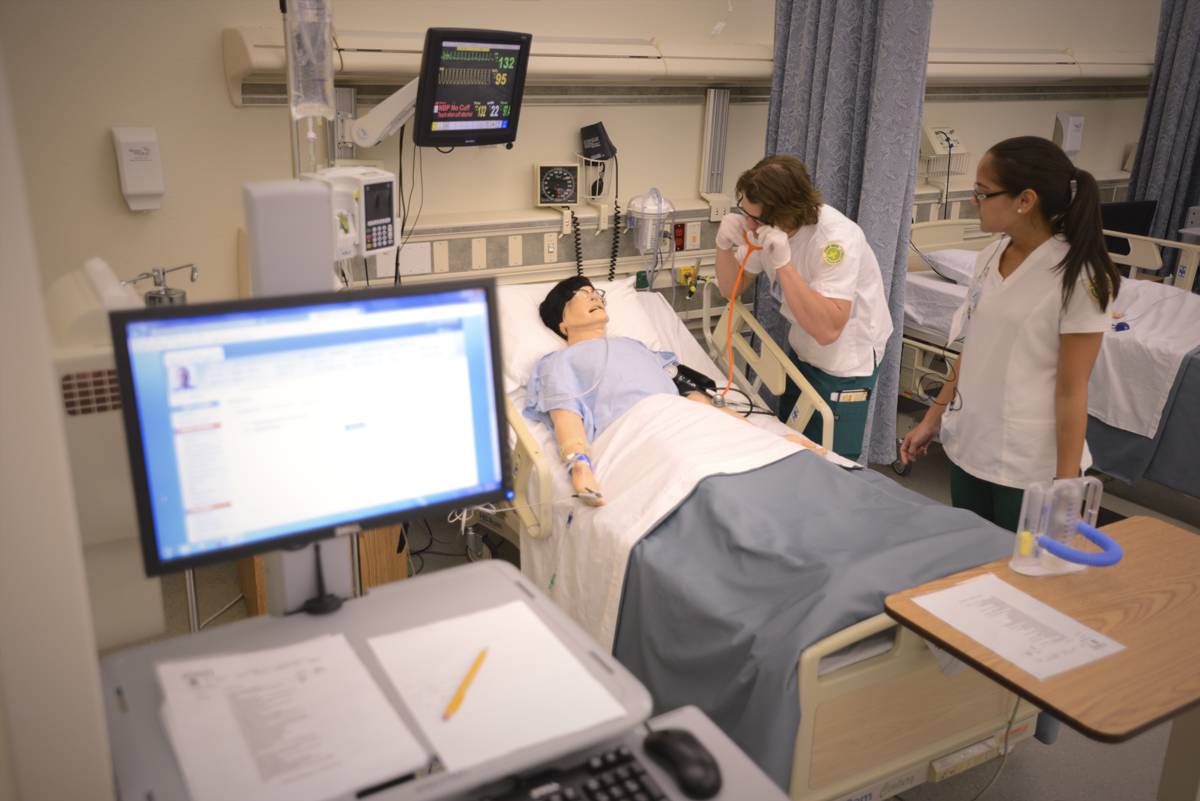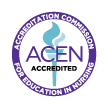
Contact the Pensacola State College Nursing Department for assistance in planning your program of study.
ACCREDITED BY:
The Registered Nursing program is approved by the Department of Health, Board of Nursing located at 4052 Bald Cypress Way, Bin C-02, Tallahassee, FL 32399.
The Associate nursing program at Pensacola State College at the Warrington campus located in Pensacola, Florida is accredited by the:
Accreditation Commission for Education in Nursing (ACEN)
3390 Peachtree Road NE, Suite 1400, Atlanta, GA 30326
404.975.5000
The most recent accreditation decision made by the ACEN Board of Commissioners for the Associate nursing program is Continuing Accreditation.
View the public information disclosed by the ACEN regarding this program at
http://www.acenursing.us/accreditedprograms/programSearch.htm
RELATED DOCUMENTS
- Application | Health-Related Programs Application
- Master Schedules of Clinical Rotations
- Money Back Guarantee Program
- Application | Limited Access Program Information
- Nursing RN – Program Outcomes
RELATED LINKS
- Florida Board of Nursing
- Florida Center for Nursing
- Health Sciences Learning Center
- Mary Smart Simulation Center
SITE LINKS
SEARCH PROGRAMS
INTRODUCTION
Department of Nursing Mission Statement
The mission of the Department of Nursing is to provide quality educational opportunities for the student who is seeking to enter or advance in the nursing profession. The Department of Nursing is committed to creating a learning environment that fosters academic, personal, and professional growth by supporting the professional nursing standards of care to meet health care needs of the community.
Department of Nursing Goals
Goal 1: Recruit students to fulfil community needs.
Goal 2: Respond to community needs by providing new programs and/or certifications.
Goal 3: Encourage students to participate in activities to support personal development during and after the nursing program to support the philosophy of lifelong learning.
Goal 4: Receive grant funding for Department of Nursing.
Goal 5: Prepare students to articulate from PN to AON to BSN and MSN programs, if they choose.
Goal 6: Prepare students to work competently in health care facilities in the community.
Goal 7: Refer students to support services for academic assistance.
Program Description
The Associate of Science in Nursing Degree program prepares the student to perform safe nursing care as a registered nurse under the direction of a licensed physician. This 72-credit hour program uses a combination of theoretical, simulation, and hands-on instruction. Each student is strongly encouraged to consult an advisor or counselor prior to course registration.
Program Objectives:
Upon successful completion of the program, the student will:
1. Advocate for patients, recognizing the patient or designee as the source of control and full partner in providing compassionate and coordinated care based on respect for patient’s preferences, values, and needs.
2. Collaborate effectively within nursing and inter-professional teams, fostering open communication, mutual respect, and shared decision-making to achieve quality patient care.
3. Use nursing judgment based on best current evidence to provide safe care for patients and families across the lifespan.
4. Apply principles of quality improvement to monitor the outcomes of care and minimize risk of harm to patients and providers.
5. Employ practices to ensure safety of patients and improve outcomes of care.
6. Use information and technology to communicate, document care, minimize error, and support decision making.
7. Demonstrate professionalism in the implementation of the role of the registered nurse.
Admission Requirements
Admission to the program is limited by student/faculty ratios and availability of clinical resources. All application requirements must be completed before a student will be considered for admission to the ADN program. Once all admission requirements are complete, candidates are ranked according to a point system based on GPA and HESI test scores. See ADN Information Packet for more detail.
Program Requirements
Upon acceptance to the program, the student must successfully pass a criminal level II background, a 10-panel urine drug screen, submission of a satisfactory physical examination, immunizations and vaccines and hold a current American Heart Association Basic Life Support for Healthcare Providers certification. Beforementioned must remain current, in order to progress in the program. See ADN Information Packet for more detail.
Upon graduation, the graduate will submit a background to the Board of Nursing in the state that one wishes to become licensed/certified. Each individual state licensing board will determine the applicant’s eligibility of taking the licensure/certificate exam.
IS THIS FOR YOU
Energetic people who have initiative and can work independently, prefer working in a job where duties often change, enjoy working with people, and are sympathetic and understanding of people’s needs may find this career is suitable for them.
Performance Standards
An ADN program applicant should possess the following capabilities:
- Sufficient physical, motor, sensory, intellectual, emotional, and social/ communication skills to provide safe patient care utilizing a variety of equipment in different health care environments. Examples of performance standards for nursing practice are outlined below.
- Be of sound mind and body to perform the professional duties of a nursing student without becoming injurious to self or others.
|
Technical Standards/ Physical Abilities & Skills |
Standard |
Examples |
|
Mobility |
Physical abilities sufficient to move independently from room to room, walk in hallways, maneuver in small places such as patient rooms, medication rooms. |
Walk independently with patients from department to department, around the patient room, down the corridor, from one patient room to another to take care of all patients on a team and to assist in the transport of all patients from bed to bed and bed to chair; walk; stand; sit for long periods of time; stoop; lift patients; squat; reach; twist; bend; push; pull; drag; and climb. |
|
Motor Skills |
Gross and fine motor skills to practice safe and efficient patient care. Sufficient manual dexterity to manipulate equipment in the patient care setting. |
Manual dexterity to perform patient care procedures and apply principles of infection control. |
|
Hearing |
Auditory ability sufficient to monitor and assess health needs. |
Auscultation of breath sounds, heart sounds, blood pressure, bowel sounds, hearing alarms, call bells telephones in patient care, converse with patients, family and staff from varying distances with varying audible sounds. |
|
Visual |
Visual ability sufficient for observation and assessment necessary to provide safe patient care. |
Read patient charts, flow sheets, monitors, etc.; assess patient skin tones; read thermometers; assess wound status and non-verbal behaviors. |
|
Tactile |
Tactile ability sufficient for physical assessment and to provide safe patient care. |
Perform and assist with patient care activities. |
|
Communication |
Communication abilities sufficient for interaction with others in coherent and concise oral and written form. |
Follow spontaneous verbal and/or written instructions; communicate patient’s response to therapy to other members of the health care team; document patient care/treatment on health care forms utilizing various means of media; consult with health care team members/workers in a professional manner. |
|
Interpersonal |
Interpersonal skills sufficient for interaction with patients, families and groups from diverse backgrounds (cultural, emotional, intellectual) in a variety of health care settings |
Conversing effectively with patients, families, and groups and in stressful patient care situations such as emergencies. |
|
Critical |
Critical thinking sufficient for clinical decision-making |
Readily respond with appropriate nursing/medical interventions and treatment plans. |
BEYOND GRADUATION
Graduates of Associate Degree Nursing (ADN) program, who hold a Registered Nursing (RN) license, may continue their education and training through the college’s RN to BSN program (Bachelor of Science in Nursing) and earn additional skills in management, leadership, theory, and research.
RELATED CAREER OPPORTUNITIES
Primary Employers
Graduates from the Nursing (Associate Degree) RN program work in hospitals, offices and clinics of medical doctors, nursing homes, schools, and home health care services.
Occupations
Registered Nurses/Associate Degree Nurses
Provide care to individual patients experiencing acute or chronic health problems. Nursing practice includes utilizing communication skills, acting as a health teacher, directing other health workers in selected aspects of care and providing direct patient care. RNs are typically concerned with the “whole person” providing for the physical, mental, and emotional needs of their patients. They advise patients, help in rehabilitation, promote good health, and prevent illnesses. Graduates of RN programs qualify for entry level positions as staff nurses and may advance in management to assistant head nurse or head nurse. Usually the work setting determines day to day job duties.
Hospital Nurses
Form the largest group of nurses. Most are staff nurses who provide bedside nursing care and carry out the medical regimen prescribed by physicians. They may also supervise licensed practical nurses and aides. Hospital nurses usually are assigned to one area such as surgery, maternity, pediatrics, emergency room, intensive care, or treatment of cancer patients or may rotate among departments.
Private Duty Nurses
Care for patients needing constant attention. They work directly for families on a contract basis or for a nursing or temporary help agency which assigns them to patients. Private duty nurses provide services in homes, hospitals, nursing homes, and rehabilitation centers.
Head Nurses or Nurse Supervisors
Direct nursing activities. They plan work schedules and assign duties to nurses and aides, provide or arrange for training, and visit patients and observe nurses to insure that care is properly carried out. Head nurses may also insure that records are maintained and that equipment and supplies are ordered.
MONEY-BACK GUARANTEE PROGRAM
The Money-Back Guarantee Program was created by the Florida Legislature in 2021 with the Reimagining Education and Career Help (REACH) Act. Students who complete this program and are not employed six months after graduation are eligible to request a full refund of their tuition costs.

 PirateQ
PirateQ 
